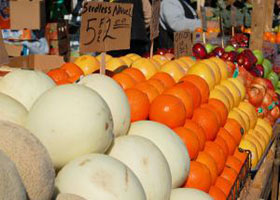
 We know that global food inflation is now a major risk (it’s now hitting Canadian consumers). But could this warning from the World Health Organization about radiation levels in the Japanese food and water supply could put further pressure on world food prices? That remains to be seen but the announcement is certainly a blow to those who have been working hard to avert a nuclear catastrophe in Japan.
We know that global food inflation is now a major risk (it’s now hitting Canadian consumers). But could this warning from the World Health Organization about radiation levels in the Japanese food and water supply could put further pressure on world food prices? That remains to be seen but the announcement is certainly a blow to those who have been working hard to avert a nuclear catastrophe in Japan.
(Reuters) – The World Health Organization said on Monday that radiation in food after an earthquake damaged a Japanese nuclear plant was more serious than previously thought, eclipsing signs of progress in a battle to avert a catastrophic meltdown in its reactors.
Engineers managed to rig power cables to all six reactors at the Fukushima complex, 240 km (150 miles) north of Tokyo, and started a water pump at one of them to reverse the overheating that has triggered the world’s worst nuclear crisis in 25 years.
Some workers were later evacuated from one of the most badly damaged reactors when smoke briefly rose from the site. There was no immediate explanation for the smoke, but authorities had said earlier that pressure was building up at the No. 3 reactor.
Smoke was also seen at the No. 2 reactor.
The March 11 earthquake and tsunami left more than 21,000 people dead or missing and will cost an already beleaguered economy some $250 billion, making it the world’s costliest ever natural disaster.
The head of the U.N. atomic agency said the nuclear situation remained very serious but it would be resolved.
“I have no doubt that this crisis will be effectively overcome,” Yukiya Amano, director general of the International Atomic Energy Agency (IAEA), told an emergency board meeting.
“We see a light for getting out of the crisis,” a Japanese government official quoted Prime Minister Naoto Kan as saying.
But news of progress at the nuclear plant was overshadowed by mounting concern that radioactive particles already released into the atmosphere have contaminated food and water supplies.
“Quite clearly it’s a serious situation,” Peter Cordingley, Manila-based spokesman for the World Health Organization’s (WHO) regional office for the Western Pacific, told Reuters in a telephone interview.
“It’s a lot more serious than anybody thought in the early days when we thought that this kind of problem can be limited to 20 to 30 kilometers … It’s safe to suppose that some contaminated produce got out of the contamination zone.”
However, he said there was no evidence of contaminated food from Fukushima reaching other countries.
Fukushima is the world’s worst nuclear accident since Chernobyl, but signs are that it is far less severe than the Ukrainian disaster.
“The few measurements of radiation reported in food so far are much lower than around Chernobyl in 1986, but the full picture is still emerging,” Malcolm Crick, secretary of the U.N. Scientific Committee on the Effects of Atomic Radiation, told Reuters. (read the full article).
